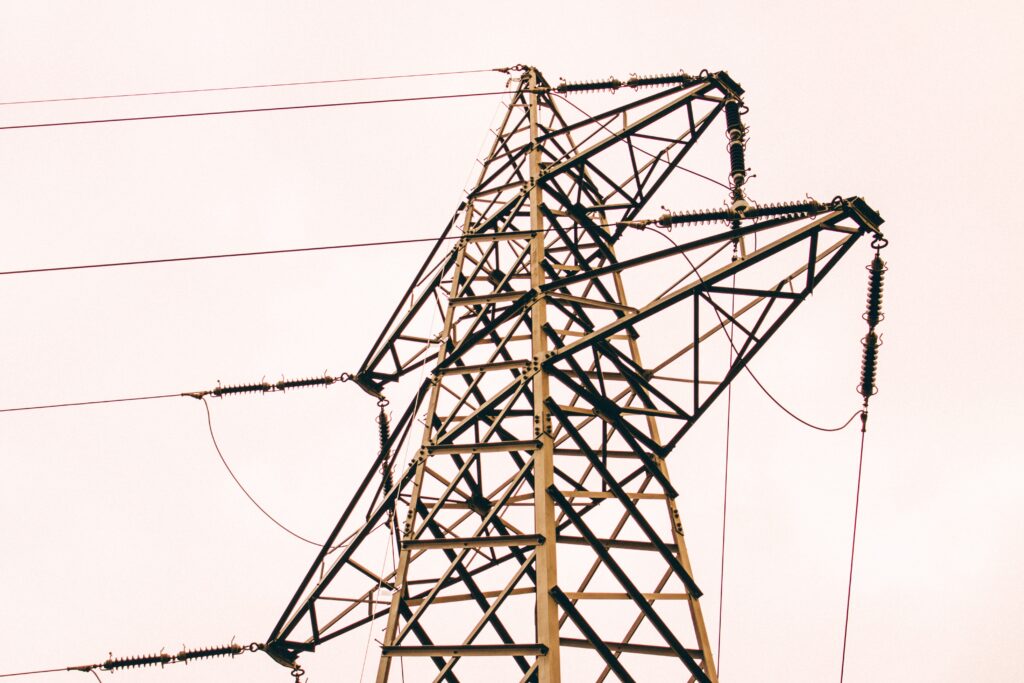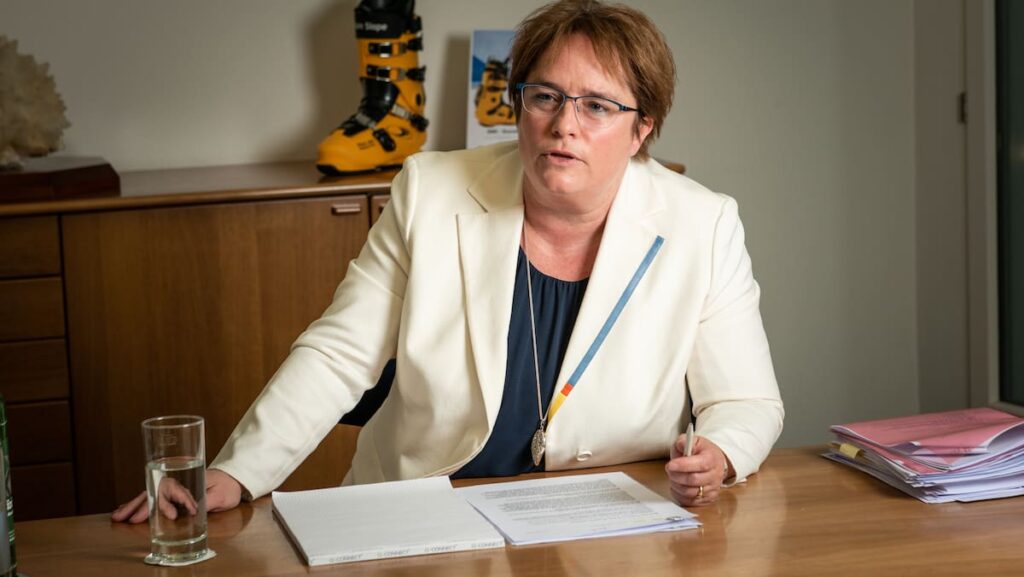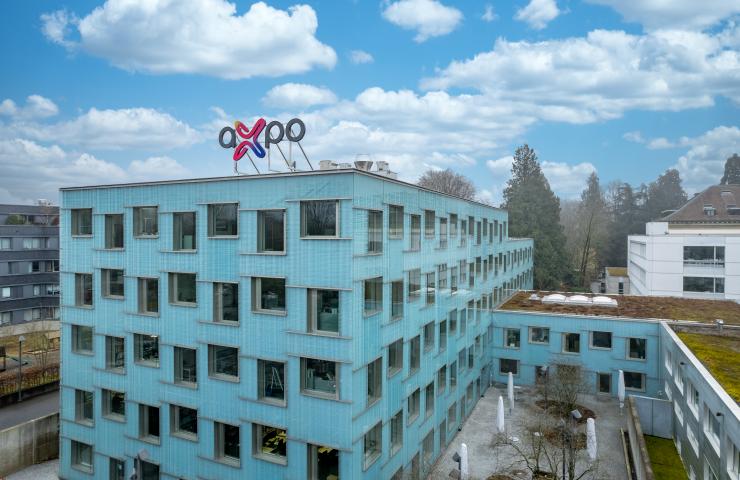Mon, Oct 10th 2022
Writing in local newspaper Tages Anzeiger today, Marius Huber takes a deeper look at Switzerland’s largest producer of renewable energy, Axpo Holding, and how Zürich may have made a mistake becoming mixed up with the company more than 20 years ago.

Power lines outside of the Swiss capital of Bern.
More on Axpo
Axpo Holding accounts for more than half of the country’s renewable electricity from hydropower. In fact, Axpo has more than 5,000 megawatts (MW) of renewable energy capacity across Europe, including wind energy, biomass production, photovoltaics and hydropower.
In September, Swiss Parliament extended a CHF 4 billion credit line solely for Axpo. They’ve since extended another CHF 10 million to other Swiss suppliers, although many say they will not need bailout money.
Supporters of the bailout, like Energy Minister Simonetta Sommaruga, say it is the right thing to do while electricity providers face unparalleled price irregularities in the coming months. Sommaruga said in a recent news conference that the government had to step in, so that a “wildfire” of surging prices did not consume energy providers this winter.
Critics of the move, like members the Swiss People’s Party (SPP), say electricity companies did not do their homework and are already profiting nicely off higher electricity prices. “The rescue package is not about supplying Switzerland,” SPP vice president Magdalena Martullo told Blick.
“In March, Axpo had CHF 65 billion in speculative transactions. That’s almost our federal budget! In the meantime, the company’s own electricity production was already being sold abroad for years to come. Now Axpo’s speculative casino is almost on its knees and the federal government has to step in,” Martullo added. (Read more: How Switzerland’s energy crisis is pulling the nation apart).

Martullo went as far as saying the federal government had allowed itself to be blackmailed by Axpo for CHF 4 billion.
How did we get here?
Indeed, Axpo has grown from a once small, Swiss company to a “trading house that pulls through deals from New York to Kosovo and Bucharest to Singapore,” Huber writes. Most Swiss residents did not notice the transformation until now that there is a looming energy crisis and they are questioning “Who will keep the lights on?”
Before the European Union announced that it would open its electricity market in 1999, Zürich’s energy came from two state-owned companies: NOK, which produced nuclear and hydro power, and EKZ, which connected the electricity to the Zürich power grid. All was state-owned, but energy was plentiful and secure, according to Huber.
When the open market did launch, the monopoly fell apart. NOK needed to become “bigger and cheaper,” so it merged with other northeastern Swiss cantons to form Axpo by the end of 1999. Except EKZ’s power grid was never integrated with Axpo’s power plants and Axpo at this time functioned as more of an energy retailer, instead of a true supplier. Peter Wiederkehr, the former executive of NOK, became the first head of Axpo in 2000.

Axpo’s Swiss headquarters in Baden.
The advent of Axpo
In 2001, Axpo began trading on the open electricity market and took over Laufenburg (EGL), a more experienced international electricity trader.
“In the years that follow, EGL becomes the nucleus of those business models from which Axpo lives today,” Huber writes. Axpo began selling excess Swiss electricity to Italy where the prices were better. This created a blueprint for future transactions and helped Axpo turn a profit which would cushion price fluctuations.
“These are the days when Swissair, freed from the state, is heading out and the liberalized postal service is dismantling a thousand branches,” Huber writes. “A slim majority of Zürich’s voters has had enough of this and is therefore burying the plan to transform EKZ into an AG and integrate it into Axpo. The power grid remains with the state.”
Zürich government councilor at the time, Dorothée Fierz (FDP), comes up with a new plan: Axpo and EKZ can exist side-by-side, but the canton will keep a “strategic stake” of shares in Axpo in order to influence the security of the supply. And while everything appears the same on the outside over the next decade, “everything is different” on the inside as Axpo keeps evolving in the trading sphere, Huber writers.

The Kernkraftwerk plant makes a substantial contribution towards Switzerland’s energy supply. The group Stop Blackouts is pushing Switzerland to rely more heavily on nuclear power.
The cash cow
The same year that the Swiss electricity market opens in 2009, Italian-Swiss citizen Domenico De Luca takes over as the Head of Energy Trading at EGL.
“As soon as De Luca sits in the executive chair, EGL speculates so heavily that profits plummet,” Huber writes. De Luca reacts by focusing more heavily on attracting investors to Axpo’s lesser-known product, Origination.
Origination is an intermediary service under which Axpo guarantees electricity producers a long-term energy source. The service fills a gap between investment banks, who understand risk, and utilities, who understand energy sources. While most investors would shy away from backing the construction of risky, reusable energy systems, such as solar and wind, Origination steps in. The project succeeds and moves into 40 different markets from Asia to the U.S. It also becomes Axpo’s most profitable sector.
“For me, our advantage as the Axpo Group is that we are able to take on long-term risks,” De Luca says in an interview at the time. He refers to the fact that Axpo is backed by Zürich and therefore protected from the risk of defaulting on loans.
“In an emergency there is always someone to pay. The general public,” Huber writes.
In the years following the opening of the Swiss electricity market, EKZ severs ties with Axpo and moves to less expensive suppliers. Today, Axpo holds 18 percent of EKZ’s shares. Meanwhile, Zürich still has a 37 percent stake in Axpo.
“Twenty years after its birth, the group still hovers in an intermediate realm. Made for a liberalized market, but still with one leg entangled in the canton of Zürich,” Huber writes. But even despite the majority stake, Axpo “has no mandate to supply the Axpo cantons with electricity” thanks to a 1914 contract written between NOK and Switzerland. When Axpo absorbed NOK, the contract – “a living fossil” – remained.

Zürich is afraid of breaking up with Axpo and losing electricity.
Why hasn’t Zürich broken up with Axpo?
Cantonal residents and the fear that they will lose electrical infrastructure to foreign companies is what has prevented Zürich and Axpo from parting ways.
“Nothing works without electricity, which is why the state can never let it out of its hands completely. As soon as there are disturbances, it has to intervene again. You can see that now,” says the now-retired head of Axpo, Wiederkehr. He served as a cantonal councilor for years before joining as the head of Axpo. He says his vision for Axpo was a regional one.
There are already calls for Zürich officials to return to the Axpo board of directors, so that the interests of its residents will not be forgotten, but it remains uncertain if that kind of leverage is possible anymore. What is certain is that the Axpo name will continue to be at the forefront of discussions in Parliament and in Swiss households as the energy crisis peaks. And that CHF 4 billion government bailout may come back to haunt the supporters.
This article may be freely shared and re-printed, provided that it prominently links back to the original article.
